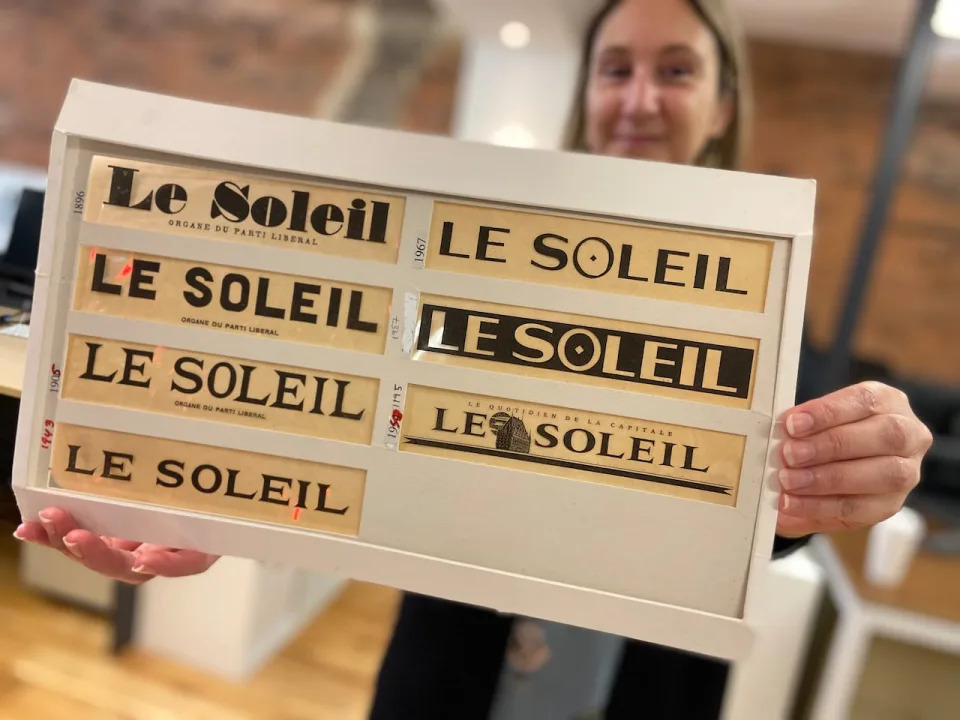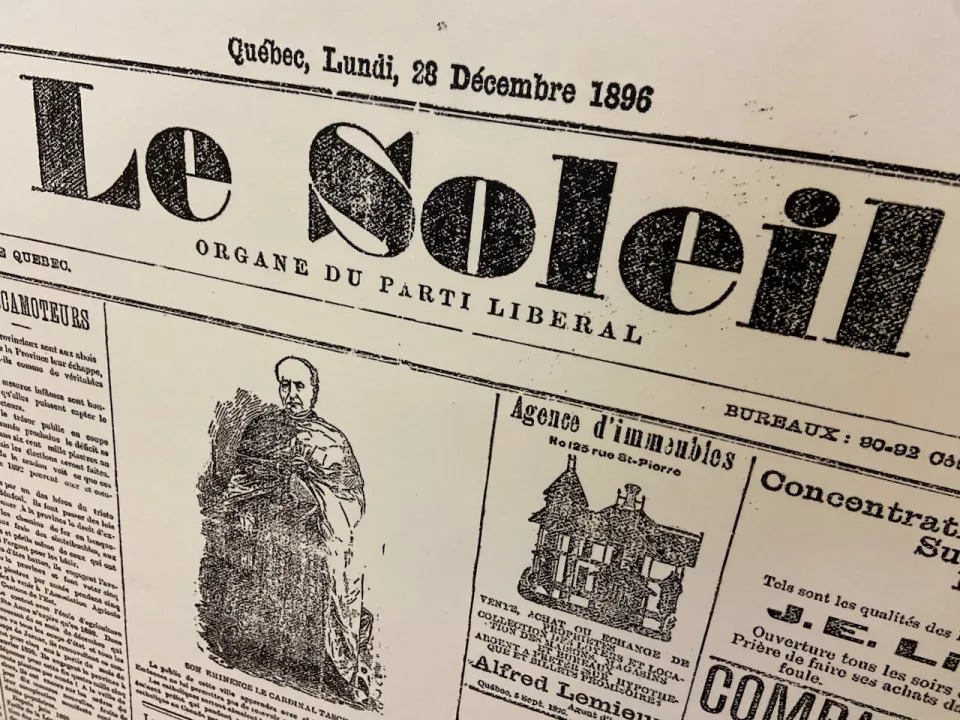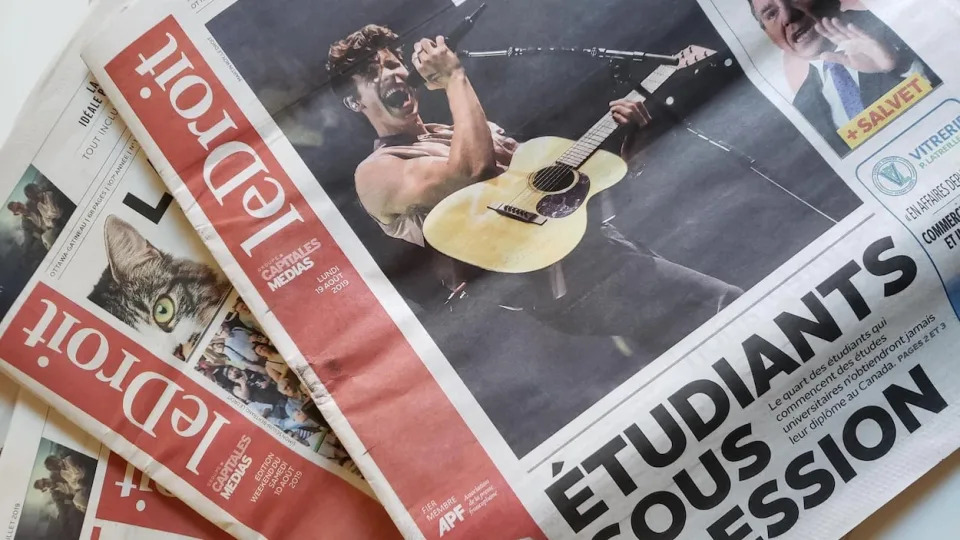Quebec City newspaper Le Soleil ends print edition after 127 years
CBC
Sat, December 30, 2023

René Dufresne, the director of publication at Le Soleil holds the last paper edition of the newspaper set to be published on Dec. 30. (Mireille Roberge/Radio-Canada - image credit)
The last print edition of Le Soleil newspaper is hitting the stands today — a whopping 96-pages taking readers down memory lane as the Quebec City-based publication goes completely digital after 127 years in business.
Editor Marc Gendron says it's a decision that's been a long time coming as more readers opt for digital subscriptions over print. The transition was always part of its business plan ever since the newspaper became a co-operative in 2019, he says.
"It's only a chapter that is closing and it's the beginning of a new one which is exciting," Gendron told CBC's Quebec AM.
Based in Quebec City, the newspaper covers stories from the Beauce region all the way to eastern Quebec. Initially a daily, Le Soleil pared down its print editions to only Saturdays in March 2020 to help deal with a drop in revenue.
Valérie Gaudreau, the former editor-in-chief for Le Soleil and now a columnist, says that even printing once a week was becoming difficult financially. Plus, the younger generation doesn't really read the paper, she said.
"There's a little mixed feelings but I guess it's a good decision we have to make just to survive as media in our world," said Gaudreau.

Le Soleil newspaper was founded in Dec. 28 1896. In March 2020, it pared down its print edition to Saturdays only.
Le Soleil newspaper was founded in Dec. 28, 1896. In March 2020, it pared down its print edition to Saturdays only. (Mireille Roberge/Radio-Canada)
She suspects that in five years there won't be any more print newspapers circulating in Quebec.
There were 247 daily and community newspapers in the province in July 2022, according to the most recent data from News Media Canada. That was tallied before Métro Média folded shutting down its 17 publications in Montreal and the Quebec City region.
Magda Konieczna, an associate professor of journalism at Concordia University, says Le Soleil's move to digital is part of a global trend. However, reducing the visibility of a publication has to be accompanied by proper marketing, especially since Meta has blocked news shared on its social media platforms, she says.
"There's something about having a physical paper present in your life that's sort of harder to ignore or forget about than going online," she said. "People need to know that these publications are out there and that they're covering their communities."
"There's really a gap in local news information here and people have almost kind of accepted that gap," she says, adding that online publications can experiment with new ways of engaging with audiences that isn't available in print.
Gaudreau says what has made Le Soleil stand out since its finding in 1896 is the presence of its journalists in communities that aren't always covered by larger publications.
"That makes us different from the others," she said. "Why would [people] pay for us if it's not to learn things they won't learn anywhere else?"

The front page of the very first edition of the Le Soleil newspaper. It would publish its first photo three years later and become the first Canadian publication to do so.
The front page of the very first edition of the Le Soleil newspaper. It would publish its first photo three years later and become the first Canadian publication to do so. (Mireille Roberge/Radio-Canada)
Le Soleil became the first Canadian newspaper to print a photo in 1899. Almost a century later, in 1996, it became the country's first French-language newspaper to launch a website.
"We're relying on a really solid past with a good reputation but we're embracing a totally new mindset and new way of working and it's a new world for us that we're exploring," said Gendron.
He adds that there will be some job cuts, but that everyone leaving is doing so through a departure plan that was negotiated with the union.
The final print edition of Le Soleil is just short of 100 pages and will take readers back in time, showing them some of the paper's most famous front pages as well a deep dive into what makes Quebec unique.
Le Droit goes digital after more than a century in print
CBC
Sat, December 30, 2023 a

Pierre Bergeron, a retired editor at Le Droit, holds a copy of the Ottawa-Gatineau newspaper. The French-language paper published its final print edition on Saturday and is now available exclusively online. (Emilien Juteau/Radio-Canada - image credit)
After more than 100 years in print, Le Droit, a prominent French-language newspaper serving the Ottawa-Gatineau region, has published its last physical edition.
The final paper rolled off the presses Saturday, marking the last step in Le Droit's gradual transition to a digital publication. The paper had already switched in 2020 from printing six times a week to once a week on Saturdays.
According to editor-in-chief Marie-Claude Lortie, the decision to go exclusively online has been a long time coming.
"When I joined Le Droit [in 2021], it was already decided. The question wasn't, 'Are we going to stop?' It was when," she told Radio-Canada's Les matins d'ici.
Though some readers will be disappointed, the transition is "a necessary change from an environmental [and] financial perspective," Lortie said in the French-language interview.
CBC
Sat, December 30, 2023 a

Pierre Bergeron, a retired editor at Le Droit, holds a copy of the Ottawa-Gatineau newspaper. The French-language paper published its final print edition on Saturday and is now available exclusively online. (Emilien Juteau/Radio-Canada - image credit)
After more than 100 years in print, Le Droit, a prominent French-language newspaper serving the Ottawa-Gatineau region, has published its last physical edition.
The final paper rolled off the presses Saturday, marking the last step in Le Droit's gradual transition to a digital publication. The paper had already switched in 2020 from printing six times a week to once a week on Saturdays.
According to editor-in-chief Marie-Claude Lortie, the decision to go exclusively online has been a long time coming.
"When I joined Le Droit [in 2021], it was already decided. The question wasn't, 'Are we going to stop?' It was when," she told Radio-Canada's Les matins d'ici.
Though some readers will be disappointed, the transition is "a necessary change from an environmental [and] financial perspective," Lortie said in the French-language interview.

The Groupe Capitales Médias, which owns the the Le Droit newspapers, is getting $5 million from the Quebec government.
The once-daily paper had already gone mostly online, publishing print editions only on Saturdays since 2020. (Maxime Huard/Radio-Canada )
In 2019, Le Droit's future was left uncertain after newspaper chain Groupe Capitale Médias, which owned it and five other Quebec newspapers, filed for bankruptcy.
According to Lortie, Le Droit joins those papers, now employee co-operatives, in making the move online.
"Personally, I don't see it as a time to mourn. I see it more as an evolution," said Pierre Bergeron, a retired Le Droit editor, in a French-language interview with Radio-Canada.
"I may be a little light-hearted in that regard, but I tell myself that journalists will find a way to do their jobs."
Lortie called the final 88-page edition a special one, dedicated to remembering the paper's impact in the community and filled with stories by writers and readers alike.
No comments:
Post a Comment